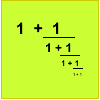Skip over navigation
Given the formula for the $n$th Fibonacci number, namely $F_n={1\over\sqrt5}(\alpha^n-\beta^n)$ where $\alpha$ and $\beta$ are solutions of the quadratic equation $x^2-x-1=0$ and $\alpha > \beta$, prove that
(1) $(\alpha + {1\over \alpha})=-(\beta +{1\over \beta}) =\sqrt 5$,
(2) $F_n^2 + F_{n+1}^2 = F_{2n+1}$ where $F_n$ is the $n$th Fibonacci number and
(3) for any four consecutive Fibonacci numbers $F_n \ldots F_{n+3}$ the formula $$(F_nF_{n+3})^2+(2F_{n+1}F_{n+2})^2$$ is the square of another Fibonacci number giving a Pythagorean triple.


Or search by topic
Number and algebra
Geometry and measure
Probability and statistics
Working mathematically
Advanced mathematics
For younger learners
Pythagorean Fibs
Age 16 to 18
Challenge Level 





Given the formula for the $n$th Fibonacci number, namely $F_n={1\over\sqrt5}(\alpha^n-\beta^n)$ where $\alpha$ and $\beta$ are solutions of the quadratic equation $x^2-x-1=0$ and $\alpha > \beta$, prove that
(1) $(\alpha + {1\over \alpha})=-(\beta +{1\over \beta}) =\sqrt 5$,
(2) $F_n^2 + F_{n+1}^2 = F_{2n+1}$ where $F_n$ is the $n$th Fibonacci number and
(3) for any four consecutive Fibonacci numbers $F_n \ldots F_{n+3}$ the formula $$(F_nF_{n+3})^2+(2F_{n+1}F_{n+2})^2$$ is the square of another Fibonacci number giving a Pythagorean triple.
You may also like
Continued Fractions I
An article introducing continued fractions with some simple puzzles for the reader.
Fibonacci Factors
For which values of n is the Fibonacci number fn even? Which Fibonnaci numbers are divisible by 3?

